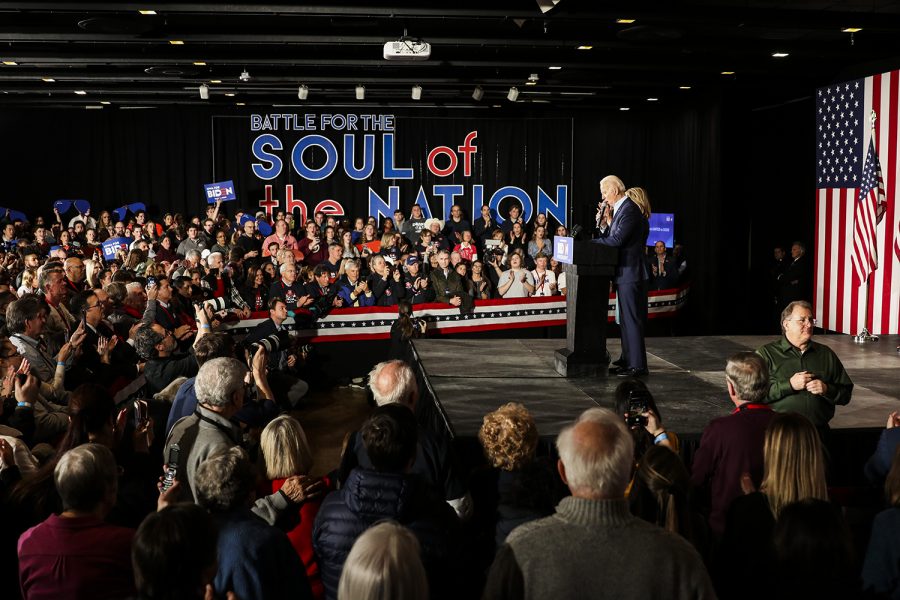So what was the point of the caucuses anyway?
Joe Biden finished fourth in the Iowa caucuses and still secured the nomination, but that doesn’t mean the results of the contest didn’t have a big effect on the party.
Former Vice President Joe Biden and Dr. Jill Biden speak during the watch party for Former Vice President Joe Biden at the Olmstead Center at Drake University on Monday, February 3, 2020. Hundreds of people attended the event to hear Biden speak on the results of the caucus.
August 26, 2020
Joe Biden became the Democratic party’s nominee for president last week, wrapping up a process of more than a year of campaigning that began with more than two dozen presidential hopefuls flooding into Iowa.
But Biden’s performance in the Iowa caucuses was underwhelming, and pundits were proclaiming the end of his campaign until he delivered a decisive victory in South Carolina and barreled to victory in the primary.
Does that mean the caucuses, long seen as a predictor of who will go on to win the nomination, are losing relevance in the nominating process?
Some Iowa caucus experts don’t think so.
Biden is only the third person since the onset of the modern caucuses to finish lower than third place and still receive the party nomination. John McCain came in fourth in 2008, and Bill Clinton finished fourth in 1992. That was an unconventional year, though, as Iowa had a favorite son in Sen. Tom Harkin, who took an overwhelming 72 percent of the vote.
Iowa’s caucuses are certainly not a perfect indicator of who will go on to win the nomination — since 1972, a little over half of the winners of the Democratic caucuses and less than half the winners of the Republican caucuses have secured their party’s nominations.
University of Missouri political science professor Perevill Squire observed after the 2008 caucuses that they’re “less of a king-maker and more of a peasant-maker,” in that they indicate who won’t win the primary, not always who will win.
Infographic by Lauren White/The Daily Iowan
In that respect, the 2020 caucuses were not unique, said David Redlawsk, the chair of the political science department at the University of Delaware who studies the caucuses. Several candidates did worse than Biden in Iowa, and none of them saw a rebound afterward.
“This year, part of what was going on was there were a massive number of candidates,” he said. “And as a consequence, what Iowa did was some of its traditional role of winnowing the field.”
Biden also didn’t have much of a ground game in Iowa, Redlawsk said, and by December he was spending far less money than some other candidates on ads. Even so, the time and resources other candidates spent in Iowa wasn’t a waste, experts said, and their investments went on to have lasting effects in the rest of the race.
Sen. Bernie Sanders, I-Vt., drew in the highest raw body count on caucus night, and placed a close second behind Pete Buttigieg in the party’s delegate allocation. Sanders and Buttigieg both received a bump in New Hampshire, the next contest, and Sanders went on to be Biden’s major opponent for the rest of the primary.
Sanders’ success gave the progressive wing of the party more input in the national Democratic platform, Grinnell College political science professor Barbara Trish said. The Biden campaign organized a unity task force with supporters of Sanders to set policy agendas, leading to a Democratic platform more progressive than in 2016.
“The unity commission gathered to kind of set the policy agenda for the party, that was largely in part because Sanders did so well,” she said. “Without that sort of strength, he might not have had the voice that he has now.”
Buttigieg, as well, went from relative obscurity to becoming a nationally recognized figure and speaking at the Democratic National Convention. Trish said this is another lasting effect of the caucuses — they brought candidates into the limelight that will affect the future of the party.
“The Democratic party in Iowa going forward is very much affected by the legacy of the 2020 contest,” she said. “People make it into the party apparatus because of their involvement in 2020.”
Iowa’s place in the nominating calendar comes under fire every four years, but there is renewed scrutiny this year after a botched result- reporting system and concerns of inaccessibility. Democratic National Committee chair Tom Perez suggested the party should get rid of caucuses in 2024, which would end Iowa’s coveted first-in-the-nation status.
Jerry Crawford, a veteran political strategist who has chaired several presidential campaigns in Iowa, said if Iowa holds on to its status, it’s unlikely that this year’s results will dissuade candidates from investing in the state in the future.
“If Iowa continues to lead the calendar, the candidates will continue to come,” he said.
Trish and Redlawsk both said Iowa is also an easy place to organize and gives candidates who may not have a large organization a chance to gain. The media markets are cheap, and face-to-face campaigning is key.
Because of this, Redlawsk said Iowa will likely maintain its relevance into the future and be a vital stop on the road to the nomination.
“The value of spending time and money in Iowa is as simple as learning how to campaign for president,” he said. “And I think every candidate does have to learn how to do it. And Iowa’s not the only place to learn it, but it’s a good starting place.”



